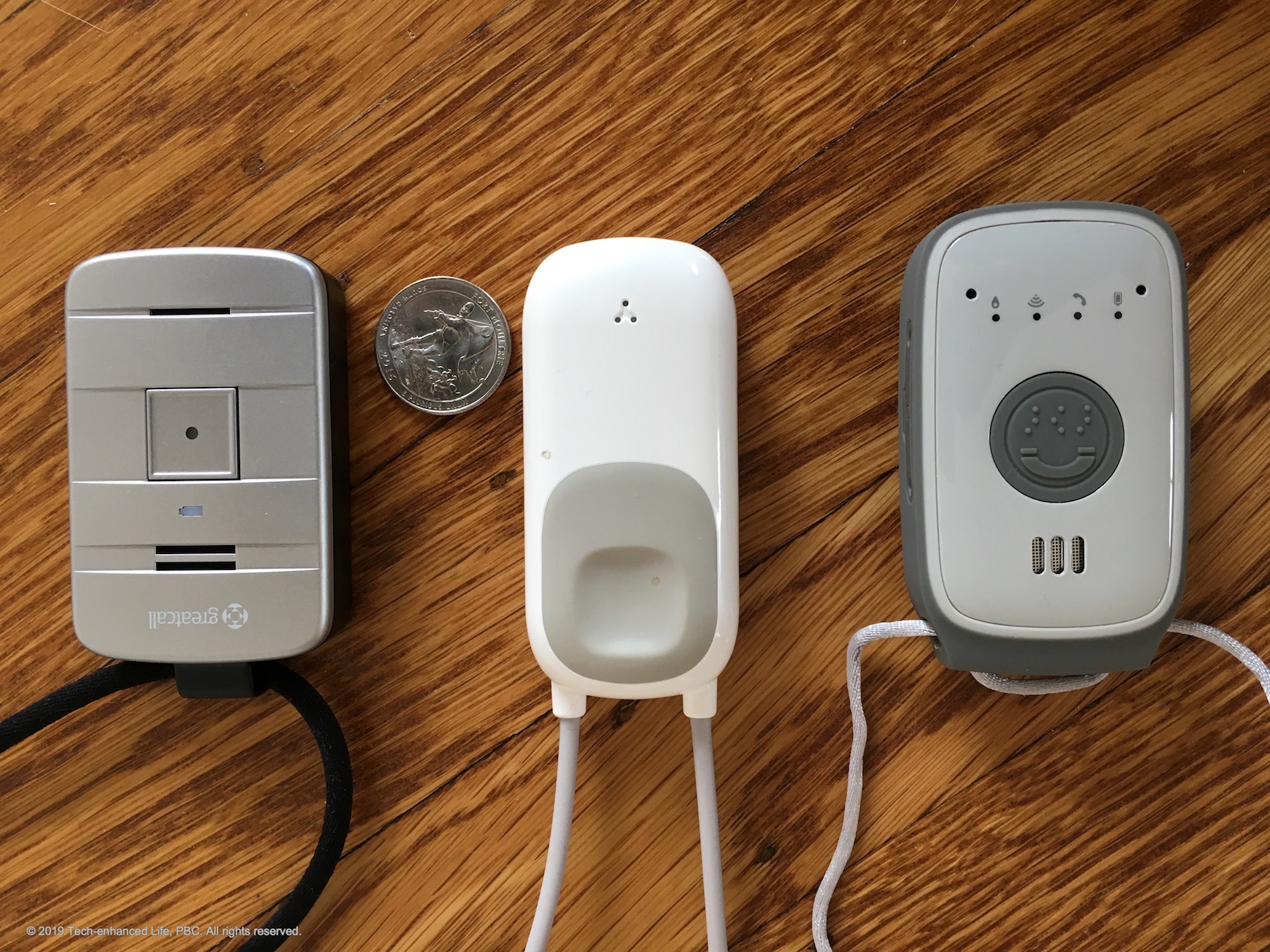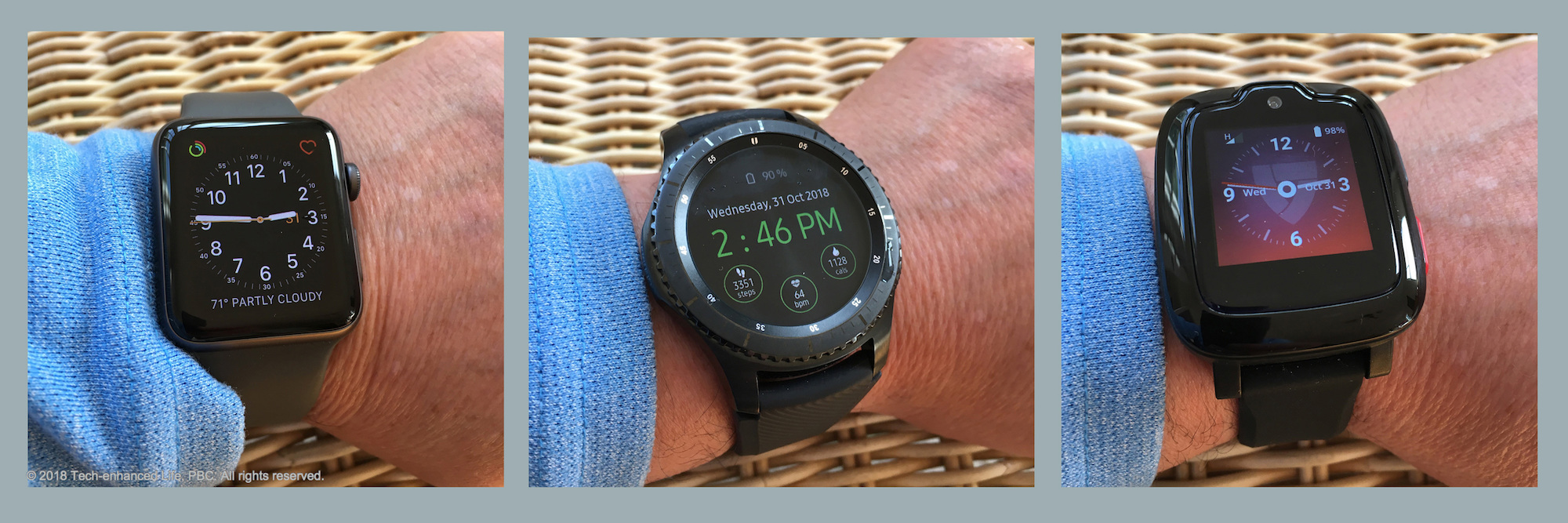By: Editorial Team | Posted: February 13, 2021 | Updated: December 20, 2023
At Tech-enhanced Life, our community of technologists, Longevity Explorers, and children of aging parents have been conducting hands-on, comparative evaluation of a wide variety of different medical alert products for years.
In this article we dive into a specific sub-category of medical alerts: medical alert systems with gps — with the goal of helping people choose the best products in this category.
Table of Contents
- About Our Research
- What is a GPS Medical Alert?
- How to Choose the Right Medical Alert with GPS
- Specific Product Recommendations
- Why Caregiver Apps are Key
- What About Costs and Contracts?
Update 2024: This article no longer includes the most recent products in this category and is not being updated. Please review for historical context and to understand the methodology and relevant features.
About Our Research
We started evaluating medical alert systems back in 2015, when members of the Tech-enhanced Life community told us they were having great difficulty making sense of the competing marketing claims, and that there seemed to be no objective source of information on the Internet about these products.
In our initial evaluations we acquired, and did in-depth, hands-on evaluation of over 50 medical alert products, and then published our research in the form of a “Guide” and “Selection Tool” — so others could benefit from our work. Since 2015 we have updated this research multiple times, and expanded it, and today it represents a rather comprehensive resource for anyone who needs to find the right medical alert for a specific life situation.
The people who do the actual evaluations are technologists rather than journalists, and are themselves either older adults or the children of aging parents.
And for our initial research project, we recruited a panel of expert advisors to guide our questions, including clinicians and aging services professionals with extensive experience in working with the older adult population that uses these medical alert systems. Professional competencies in the advisor panel included social work, physio-therapy, and nursing, and experience operating independent living communities.
We strive to produce independent and objective research — with a focus on helping older adults and their families.
Thus, our research is NOT funded by any of the vendors. Nor do we accept sponsored content or allow the medical alert manufacturers or distributors to influence what we write. For our initial research project we acquired all the products at our own expense, without the vendors being aware we were conducting the study. As we subsequently updated our research, we sometimes ask the vendors to loan us the equipment.
We do sometimes use affiliate links, which means that if you purchase products that you learn about on this website, we sometimes receive compensation as a result of being a member of an affiliate program. See How we Fund our Research.
What is a GPS Medical Alert?
A Medical Alert System with GPS is simply a medical alert system that incorporates technology that lets it connect with the GPS (Global Positioning System), which is a set of satellites.
The key point of incorporating GPS is that it lets the medical alert device / pendant / watch “know” more or less where it is at any time.
We think of medical alerts as coming in two basic categories: systems to use “at home“, and systems that are good both at home, and while you are “out and about“.
GPS Medical Alerts fit into the category of products that work when you are “out and about” (as well as at home).
We call the “out and about” category “mobile medical alerts“, and you can see more about this entire category at Mobile Alert Systems: Comparison Testing.
In fact, GPS Medical Alerts are a subset of Mobile Alert Systems, since not all mobile alert systems include GPS technology. Instead, some rely on other technologies to decide “where they are” — or even do without that capability altogether.
Today, most mobile medical alert systems do include GPS, and so there is a substantial overlap between the terms “mobile medical alerts” and “GPS medical alerts”.
Why Would You Want GPS in a Medical Alert?
There are several reason why it is extremely desirable to have a medical alert system that includes GPS capability if you use it beyond your own house and garden.
- If the person carrying the medical alert has a medical emergency (falls, stroke etc) — which is really what these products are for — it’s critical for the “responder” to know where that person is, so they can send help. While the person might be able to tell the responder where they are exactly, there are many reasons why that may not always work well (the person is unable to speak, or disoriented, for example). With some type of “self-locating technology” like GPS, the “device” knows where it is, and can automatically send that information to the responder when an emergency alert is triggered.
- In a quite different situation, some people rely on a medical alert device to be helpful in a situation in which a person with dementia has “wandered”. In that situation, the person themselves might want directions home. Or a caregiver might want to be able to locate the individual. In principle, having a medical alert with GPS can allow either of these capabilities, although not all medical alerts with GPS include these features. For more on this topic, see Location Devices and Trackers for Dementia).
Some Downsides
There are some downsides to a GPS Medical Alert.
To be able to communicate when out and about, as well as connect to the GPS, the devices need to include both GPS technology and a cell connection. This makes them bulkier and more power hungry than the “at home” products, which only work at home and thus do not need either of these two wireless technologies. (they include a different wireless technology capable only of much shorter range, but requiring less power).
In addition to size, the main negative consequence is that medical alert systems with GPS need to be recharged relatively frequently.
Whereas some “at home” medical alerts contain a battery which you only need to charge maybe annually, a typical GPS medical alert needs recharging somewhere between daily and weekly, depending on the model and brand.
How to Choose the Right Medical Alert with GPS
We have found two types of people use our medical alert research.
- People who want to understand the entire category in depth, develop their own “desired feature list”, and then study in-depth reviews of products that include those desired features.
- People who just want to be told what they should buy.
For the first group, we developed a Learning Module and a Selection Tool that allow someone to develop their own personalized set of “desired features” — and screen all the products we have evaluated against that feature list, and read our in-depth reviews of those products.
For the second group, we developed a series called Just Tell me What to Buy.
If you have got this far, and are sure you need a Medical Alert System with GPS, below are our specific recommendations for this category.
Specific Product Recommendations
Every year or two new products emerge in the medical alert space, and we try and keep our research up to date.
Here is a snapshot of what we recommend as of 2021.
An important decision to make, if you want a medical alert with GPS, is between the conventional form factor for a medical alert (a pendant with a large button you press in emergency), or one of the newer type of “medical alert watches“, that look like a watch and often also include extra smartwatch features like step counting.
Conventional Medical Alerts with GPS

Caption: “Conventional” Medical Alert Systems with GPS. L-R: GreatCall Lively Mobile Plus, Philips Lifeline GoSafe 2; Medical Guardian Active Guardian.
There are many medical alerts with GPS today.
Most of the major medical alert vendors have a product like this in their lineup. They are typically called a mobile medical alert, or some similar term. Note that they do NOT all have GPS. But most do.
Three of the products we especially recommend in this category are as follow (current 2021). [links go to our detailed reviews, where you can also find links to manufacturer’s websites]
- Philips Lifeline, GoSafe 2 (no longer available as of 2023)
- GreatCall, Lively Mobile Plus
- Medical Guardian, Active Guardian
We think these are all good products, although they have subtly different feature sets and price points, that mean an individual will likely prefer one over the others — depending on their specific life situation.
UPDATE 2023: There are some new entrants in the category of mobile medical alerts which we have not reviewed. While the products above are still good (if available), there may be newer products that are even better.
To read our detailed comparisons, get a good overview of this category of mobile medical alerts, and learn which product we recommend for different types of people, see:
Medical Alert Watches with GPS

Caption: examples of smartwatches that also function as medical alerts. (See “Smartwatch as Medical Alert” article for details.)
There are pluses and minuses to choosing a smartwatch medical alert.
- In the “plus” category, they are typically much more stylish than a conventional medical alert pendant, which means they are more likely to actually be worn. And they have “extra” useful features, like telling the time, and counting steps, that may mean you can avoid the “multiple wearables” annoyance.
- In the “minus category”, they are arguably not quite as “perfect” at calling for help yet, although we see that changing in time, as they are improved. For example, they lack a big, easily accessible, single button that helps people “use them when hurt or confused”. Many of them do not include automatic fall detection, and there is some debate about how well fall detection actually works when the device is “on the wrist” rather than “around the neck”.
In the article linked to below we have a more in-depth discussion of how to decide whether you need a conventional medical alert or a medical alert smartwatch.
Medical Alert Watches are their own category. Rather than repeat our comparisons of these products in this article, you can learn all about them (and which we recommend, and why) at the link below.
Why Caregiver Apps are Key
All the medical alerts with GPS have the following capability.
When the person has an emergency and triggers an “alert”, then the device will transmit a location to the “monitoring center” — where the responder can see it and send help to the appropriate place.
However, not all such medical alerts have the capability for a caregiver or friend to be able to see where the alert happens. And only some include the capability of seeing where the wearer of the alert is on an “as needed” basis.
If you want the capability for someone other then the professional monitoring service to know where the alert is, you need a product that includes a “caregiver app“.
Many, but not all, of the products in this category include a caregiver app. See individual reviews for details.
And the things to watch out for are as follow.
- Does the caregiver app allow a caregiver to find where the medical alert is, even if no-one triggered an alert (relevant for dementia patients)?
- Who controls the privacy settings that govern who can see what and when?
- What other capabilities does the caregiver app have? Can you tell when the battery needs charging? Does it allow you to connect to the person carrying the alert and talk to them? Can you set “boundaries (geofencing)”?
What About Costs and Contracts?
The product costs change frequently, and the best sources for pricing are the websites of the vendors (see reviews for the website links).
In the “comparison articles” mentioned above (Smartwatch Comparisons and Mobile Alert Comparisons), we typically include some general pricing comparisons for the products we recommend.
Pricing can be confusing.
In general, there is an upfront fee to acquire or activate the product, and an ongoing monthly “monitoring fee”. Some products have a much larger upfront cost, then a lower monthly cost.
We typically add up the costs and compare how much the product would cost in total over one or two years. This sometimes leads to surprising results.
Most of the medical device distributors have a fairly simple set of “terms”. You can typically cancel the relationship on a month or two’s notice.
However beware. It “used” to be the practice to lock you in to a lengthy, multi-year contract that was hard to get out of. And a handful of vendors still take this approach.
Our advice: ask specifically about the contract, and avoid any vendor that has a contract that obligates you for more than a month or two or three of service.
Learn More
See our entire coverage of medical alert systems at:
*Disclosure: The research and opinions in this article are those of the author, and may or may not reflect the official views of Tech-enhanced Life.
If you use the links on this website when you buy products we write about, we may earn commissions from qualifying purchases as an Amazon Associate or other affiliate program participant. This does not affect the price you pay. We use the (modest) income to help fund our research.
In some cases, when we evaluate products and services, we ask the vendor to loan us the products we review (so we don’t need to buy them). Beyond the above, Tech-enhanced Life has no financial interest in any products or services discussed here, and this article is not sponsored by the vendor or any third party. See How we Fund our Work.
